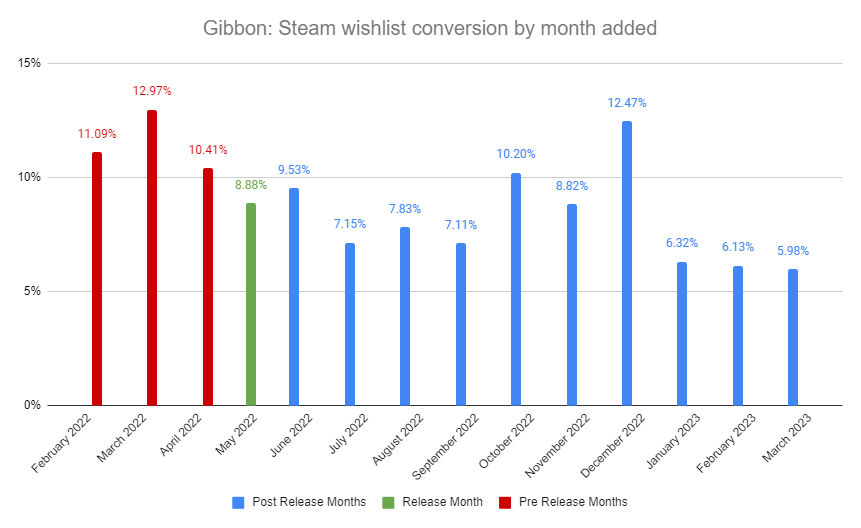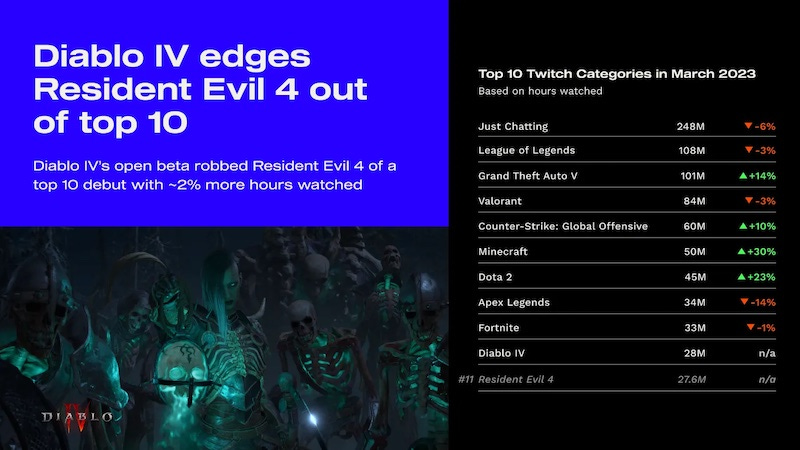Contraband Police: how it hit big & why game 'hook' matters
Publikováno: 20.4.2023
Also: more on wishlist conversion, and loads of news.
[The GameDiscoverCo game discovery newsletter is written by ‘how people find your game’ expert & company founder Simon Carless, and is a regular look at how people discover and buy video games in the 2020s.]
Welcome back, kind subscribers, to the newsletter that never ends. You choose your own adventure, in terms of which of the 100,000+ words we send you yearly (!) you’d like to read. We hope you come out with a good ending, not marooned in a dungeon?
Our lead story today expands on a game we covered in passing in a Plus-exclusive newsletter a few weeks ago, Contraband Police, with extra stats and comments from the developers themselves. So… let’s go catch some smugglers?
[Heads up: our GameDiscoverCo Plus paid subscription includes our Friday ‘exclusive’ newsletter, exclusive Discord access, a login to our Steam ‘Hype’ & post-release game performance chart back-end, multiple eBooks & more. We highly recommend it…]
Contraband Police: analyzing its Steam success
For those who don’t know, Crazy Rocks’ & PlayWay’s ‘80s communist ‘bust those smugglers’ sim Contraband Police has been one of the standout new releases of March for Steam. As Game World Observer noted a few days ago:
“On April 4, Crazy Rocks announced that Contraband Police had sold 250,000 units since its launch on March 8… 49,000 copies of Contraband Police were sold in the first 24 hours, according to PlayWay CEO Krzysztof Kostowski.”
Polish publisher PlayWay continues to be a fascinating subject. We wrote about them back in 2021, explaining how they leverage a web of tiny development companies - some listed on the Warsaw Stock Exchange - to make hyper-targeted sim games.
Some publicly traded Polish game companies have faded, but PlayWay, with a market cap of around USD $670 million, has weathered the storm better than most. How? Perhaps we can work it out by diving into why Contraband Police has been such a smash.
We reached out to Crazy Rocks founder Staszek Gromadowski to find out how this tiny Polish dev - three devs at the start, five towards the end - created a big Steam hit:
The game significantly expands on the ‘Papers, Please’ subgenre: yes, we think document-checking is a subgenre! And the core gameplay, as Gromadowski agrees, is just that - making sure shady types have the right passport info to pass your checkpoint. But the game also “introduces the wide[r] scope of police work” with manual physical checking of cars, and even some driving/chasing gameplay.
PlayWay’s game designs are partly top-down, and maybe that’s good? PlayWay is ruthlessly focused on commercial ideas. And when I asked him how the title was devised, Gromadowski said: “I remember I came up with the general idea of policeman checking the vehicles, and Krzysztof Kostowski (PlayWay CEO) was behind the contraband theme and the game name itself.” It’s a really clever and catchy hook.
Crazy Rocks did a lot of gameplay iteration to crack the formula: where game concepts handed out from the PlayWay mothership often fail is in execution. Titles like Coal Mining Simulator - pretty good idea, btw - struggle to live up to the idea and initial ‘target gameplay’ trailers. But for Contraband Police, a popular game Prologue was a) already good and b) improved on multiple times, and Gromadowski said they “listened to the gamers”. They had the skills, basically.
The game’s metrics were good, but streamers were key: it had been on Steam for many years, and the title had 306,000 Steam wishlists at its release. It was its streamer support that I think really took it over the top, though. There’s a lot of high-profile YouTubers who played it immediately, because the scenario (finding hidden smuggled things!) allows them to play to their audience in fun ways. It’s way more streamer-friendly than, say, Coal Mining Simulator, and that helped.
So the game delivers in terms of quality & longevity, too - Crazy Rocks told me that the median playtime for the title is 6 hours and 5 mins - a really impressive result. And refunds are only 9%, which is decent. (The top buying countries are: U.S. 19%, China 16%, Germany 11%, Russia 5%, France 4%, btw.)
What can we learn from all of this, then? Well: don’t be afraid to ‘fast follow’ an idea and add to it. You could say that the game is too much of a Papers, Please clone, but it adds so many new twists that I don’t see any players complaining about it.
And here’s a controversial one: the PC/console game biz often centers on devs pitching publishers games the devs came up with. But if you see a genre/type of game that could work, why aren’t more publishers approaching good devs and asking them to make that type of game, even if it’s original IP and non-licensed.
Despite PlayWay’s spotty execution at times, that's certainly been working for them. (Or maybe… this is actually harder than it looks? Only one way to find out…)
How your wishlists convert before & after release..
Last week, you may recall that our second newsletter story (scroll down!) was about whether older Steam wishlists convert poorly, concluding - not really: “Worry not much about wishlist age… Worry a little bit about ‘wishlist quality’ - but not a lot.”
We used data from The Riftbreaker to show that. But we realized it might have been unclear that this data was purely via wishlists added pre-release. We actually haven’t seen much data on the entire history of wishlist conversions, including post-release…
And now, thanks to Josef Wiesner from Old Man’s Journey dev Broken Rules, we have lifetime Steam conversion % - by month added - for their Apple Arcade-funded* swing-’em-up Gibbon: Beyond The Trees, which came on on AA in February 2022, and debuted on Steam and Switch in May. (*we presume!)
The gorgeous, well-reviewed Gibbon was only on Steam for 3 months or so before release. You can see no big fluctuations in % conversion, though, even when the # of wishlists added varied from 2,500 (April 2022) to 19,000 (May 2022, launch month!)
After release, the game did get some updates, including a Daily Run mode (September 2022), which helped boost overall new wishlist additions to 4,000+ for that month - versus <1,000 in some other months.
But it didn’t change the fundamental trend, which is that post-release wishlists convert gradually less well than pre-release, with just a couple of exceptions. This may be because people wishlisting later have less opportunity to ‘pull the trigger’ since they only wishlisted recently, or are waiting for a sale. (This is not a problem, though!)
Talking of ‘pulling the trigger’, the sale website IsThereAnyDeal has its own - fairly hardcore - users, who mark down the discount that they get notified by the website to buy a game at. Here, for example, is the graph for The Outer Worlds:
Perhaps this might help you work out some of the key discounts that your potential clientele are waiting for. Or perhaps these are not the droids you are looking for. Either way, it’s more fun data to check out…
The game discovery news round-up..
Let’s finish up our free newsletters for this week, with a look at the game platforms and discovery elements that you, the game biz person, might actually care about:
Netflix’s latest quarterly results shareholder letter [.PDF] didn’t talk about games that much. But rest assured, it’s still a priority, with the company noting: “The first priority for our cash is to reinvest in our core business and to fund new opportunities like gaming and ads, followed by selective acquisitions.” More $ for games, then…
Circana/NPD’s March 2023 U.S. hardware/select software numbers totaled $4.6 billion, down 5% year on year, and Mat Piscatella explained the trends: “PS5 driving console market… big new games selling very well, just not enough of them… subscription spend growth is slowing.”
For those keeping a track on platform showcases, Nintendo dropped a new Indie World, including neat Switch titles such as Cult Of The Lamb DLC, a release date for the long awaited Mineko’s Night Market, and more. But no Silksong?
Microlinks: the wacky B&W handheld Playdate has sold 53,000 units - though only 27,000 of them have shipped, and it’s rolled out games on its Catalog store; the latest Apple AR/VR device rumors say it’ll “focus heavily on gaming, fitness, sports and collab tools”; why the games you like probably aren’t the ones that sell well.
The AARP (formerly American Association Of Retired People) released a survey into over-50 gamers [.PDF] this week. GI.biz sums it up here, noting 45% played video games at least once a month, and “84% saying they played on mobile, compared to 28% on console.”
StreamElements’ state of game streaming for March 2023 update includes info that Twitch viewing hours are static QoQ for Q1 2023 at 4.985 billion (!), but there are 95% more hours being watched than before the pandemic. And Diablo IV’s open Beta made the 10 most-watched games (above), which augurs well.
Returning to Chinese government game licensing, here’s a personal story of 530 days waiting for the gov to approve your game, from Chinese indie game studio StarryStarry: “During the period of waiting, Yutian described his feelings as waiting to win the lottery. Every time the license list was announced, it was like a lottery, full of anticipation but also the terror of disappointment.”
Microlinks: a rare wide-format profile of Apple’s CEO Tim Cook - “I’m curious, and I’m curious about how things work”; the latest titles coming to Game Pass include Minecraft Legends, Redfall & a BlazBlue 2D fighter; Meta-acquired VR studios Ready At Dawn & Downpour Interactive suffered layoffs in their latest cut.
Great piece from David Taylor in the latest Naavik newsletter about Fortnite Creative’s new payout system. He suggests that at least 20 mapmakers will be making $2 million per year if their current CCU rates persist, with “the potential millionaires increasing from just 11 to 40.” Pretty impressive if so!
Currently lighting up Twitter? Raised eyebrows on this write-up of a Zynga GDC talk on managing mobile game ‘whales’, thanks to speaker comments like: “We've done so much experimenting at Zynga with VIP. We know what's the frequency of contact. We know what call types work. We know what times to call… We know who has a higher propensity to be more susceptible to our call.”
A modest proposal from Jake Birkett at Grey Alien Games: “I have a new theory about wishlist quality but I'm not sure if it can be validated by anyone except Valve or by a big study: Wishlists gained through Steam’s ‘Popular Upcoming’ list are worthless. Perhaps ‘worthless’ is a bit strong, and I should just say ‘poor quality’.” FWIW, I suspect they convert poorly - worse than Next Fest wishlists - but still convert somewhat.
Microlinks: a research survey of U.S. teens reveals “video games are 12% of male teen wallet share (vs. 14% LY), and 32% expect to purchase a next-gen console within 2 years”; VR headset Pico 4 switched up its bundled games to include a Peaky Blinders title; Microsoft is experimenting with a Windows gaming handheld mode for Steam Deck-like devices.
And that’s about all we have for now! Plus subscribers, join us on Friday, and we’ll see everyone else on Monday for another exciting week of news, trends, and no Silksong…
[We’re GameDiscoverCo, an agency based around one simple issue: how do players find, buy and enjoy your PC or console game? We run the newsletter you’re reading, and provide consulting services for publishers, funds, and other smart game industry folks.]


